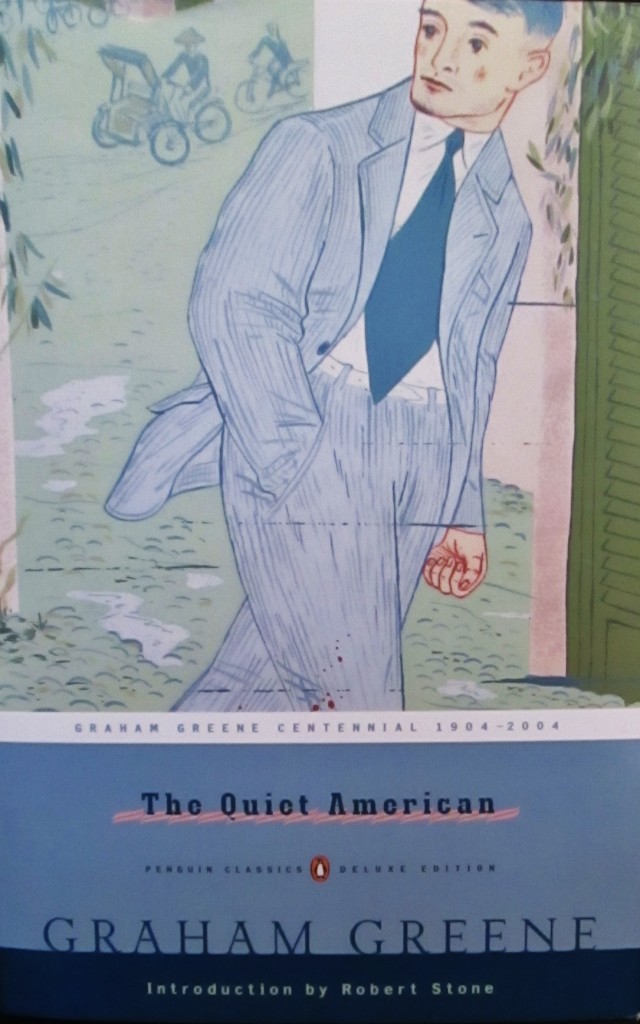
For whatever reason, every few years I end up reading a Graham Greene novel. I don’t believe this strange predilection derives from the author himself; rather, the settings, ideas, and concepts he discusses usually attract me more than his writing style. The Quiet American, of course, fits right into that wheelhouse by deriving from a time and place that isn’t much discussed in the modern world: 1950s Vietnam.
For Americans, this occurs just prior to the Vietnam War, when France still ruled Vietnam as an outlier colony – French Indochina, for those who remember their history books! France’s colonialism, as it did for many other countries, came to bite them back in the rear, as dozens of home-grown revolutionary groups began to take back Vietnam. The most frightening of all, the Communists, turned Vietnam into a front for Harry S. Truman’s containment policy, and thus France sought to fight back hard.
The central character of our tale, a British journalist named Thomas Fowler, doesn’t really care for any of this. He reports the news, objectively he says, while staying with his native mistress Phuong. He wants to live a life of simplicity; he’s had his fill of ideological conflicts and reporting on them from afar. However, an American named Alden Pyle changes all that. Pyle, in what isn’t much of a spoiler, works for some clandestine American organization who wants to insert itself into the Vietnam conflict by inserting a “third force” between the French and the Communists. Fowler, not surprisingly, doesn’t want any of this, and yet circumstances bind them together.
The Quiet American makes Fowler, Phuong, and Pyle into a love triangle…of sorts. Sure, Pyle wants Phuong, and Fowler wants to keep her, but the real interest here lies in the very strategically placed metaphor. Pyle, unsurprising, is the Quiet American (the only quiet American, as far as I can tell, is a dead American – this is not really a spoiler, since it happens in the first chapter) who talks of spreading the seeds of democracy far and wide. He believes that, if only the native population understood, they would join into an ideological conflict against communism.
Fowler dismisses such notions as pie-in-the-sky dreaming; people in Vietnam aren’t “educated” (and Fowler doesn’t mean this in a bad way). The primary needs of a subsistence society are, well, shelter and food; beyond that, most people fighting in these conflicts could care less. The Communists are simply fulfilling a human need, and that’s why so many want to join them against the French (not surprisingly, the French abused Vietnam significantly during their occupation). I would guess this is why Phuong doesn’t display much in the way of character traits – she is supposed to be innocent in her motivations for shiny things and “security”, as it were, so Greene barely gives her a motive. I hesitate to say whether Fowler’s point of view is accurate, but the book certainly thinks so!
So yes, the Quiet American is, most certainly, an anti-war novel of sorts with a particular point of view. Greene says, basically, that intervention in these conflicts for the purpose of ideology results in the loss of life and the acceptance of collateral damage as “ok”. This means that the Vietnamese people don’t really matter, that they are merely a tool in a war of ideologies; in the case of French Indochina, normal people who care little for these issues suddenly must take a side in a war they don’t understand.
I can name dozens of people I know off the top of my head who would be completely incensed that an English fop like Fowler gets to criticize American intervention in foreign countries. But, you do need to remember Greene spoke in an environment where Communism represented the greatest threat to the Western world. It’s not surprising the book was poorly received in the United States, as the review by the New Yorker says as much:
American readers were incensed, perhaps not so much because of the biased portrait of obtuse and destructive American innocence and idealism in Alden Pyle, but because in this case it was drawn with such acid pleasure by a middle-class English snob like Thomas Fowler whom they were all too ready to identify with Greene himself
It’s an interesting criticism. Yes, Fowler does turn insufferable at points (he’s a cynical British atheist – seriously, if that doesn’t sound like a 1950s version of Richard Dawkins, I don’t know what does), but Greene forces Fowler to take a side. Everyone has their tipping point; Fowler certainly does not believe himself to have one, because “journalists” must remain objective while abstractly reporting the news. Events conspire, however, to force Fowler into reconsidering his role in the Vietnam conflict. That transformation remains consistent with the character, and also shows him as far more personable than you would suspect.
So, would I recommend it? Given its short length, sure, why not? The Power and the Glory is still a better novel from Greene, at least from my theologically motivated point of view (natch, Greene was also a staunch Roman Catholic), but The Quiet American is still very engaging and well-written. Be prepared to get into the head space of the 1950s, along with a distinct political perspective, and you’ll enjoy it…probably.
